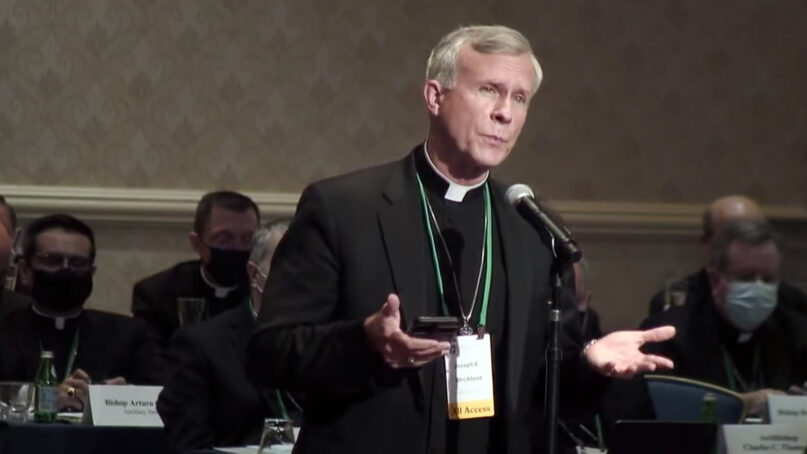(RNS) — In a private meeting with fellow Jesuits in Lisbon, Portugal, last month, Pope Francis didn’t turn the other cheek in response to a question about hostility to his leadership on the part of many American Catholics, including some bishops.
“You have seen that in the United States the situation is not easy,” he said. “There is a very strong reactionary attitude. It is organized and shapes the way people belong, even emotionally.”
While some conservative Catholics professed to be dismayed by the pope’s remark, no one disputed that America is a hotbed of anti-Francis criticism. Or that American bishops are leading the charge.
Foremost among them is Cardinal Raymond Burke, whom Francis dumped as head of the Vatican’s top court in 2014. Most recently, Burke wrote the foreword to a widely distributed pamphlet attacking the Synod on Synodality that was announced by the pope two years ago and that convenes in Rome next month.
“Synod” and “synodality,” Burke declared, “have become slogans behind which a revolution is at work to change radically the Church’s self-understanding, in accord with a contemporary ideology which denies much of what the Church has always taught and practiced.”
And then there’s the bishop of Tyler, Texas, Joseph E. Strickland, who tweeted in May, “I believe Pope Francis is the Pope but it is time for me to say that I reject his program of undermining the Deposit of Faith,” using the phrase for Catholic belief in sum. In June, the Vatican conducted a formal investigation of Strickland’s diocese.
Last month, the incoming head of the Vatican’s doctrinal office, Archbishop Víctor Manuel Fernández, told an interviewer from the conservative National Catholic Register: “Now, if you tell me that some bishops have a special gift of the Holy Spirit to judge the doctrine of the Holy Father, we will enter into a vicious circle (where anyone can claim to have the true doctrine) and that would be heresy and schism. Remember that heretics always think they know the true doctrine of the Church.”
Let the record show that American Catholicism has been here before. In the 1880s and 1890s, a group of progressive American bishops led by the archbishop of St. Paul, Minnesota, John Ireland, advocated on behalf of individual initiative and conscience, separation of church and state, and democracy as the form of government best suited to their faith — all anathema to the 19th-century Vatican.
“The people is king now,” Ireland told an audience in Paris in 1892, freaking out conservatives in the French church. The eventual result was Pope Leo XIII’s encyclical “Testem Benevolentiae” (1899), which denounced various liberal views attributed to Isaac Hecker, an American Catholic priest and missionary much celebrated by the progressives.
Such was what came to be known as the Americanism heresy. Where it challenged the anti-modernist hard line of the church after the First Vatican Council (1869-70), its successor is a riposte to the reformist vision of the Second Vatican Council (1962-65) that Francis has reanimated.
Although coming from the opposite end of the ideological spectrum more than a century later, the new Americanism heresy shares with its predecessor some classically American traits. “No power on earth can force us to violate our conscience,” Strickland tweeted earlier this year, in a right-wing echo of John Ireland — a view akin to the “Protestant principle” that no authority should be accepted which is at odds with one’s own understanding of truth.
The readiness of the new Americanists to reject papal teaching on the death penalty, the Latin Mass and the possibility of divorced and remarried Catholics receiving Communion is of a piece with the old Americanists’ refusal to toe Rome’s line on church-state separation and religious pluralism.
In a word, American Catholic exceptionalism is once again sticking in the Vatican’s craw. But back in the day, no American bishop criticized “Testem Benevolentiae,” and none was relieved of his position. This time around, at least one is pushing his luck. Hard.






